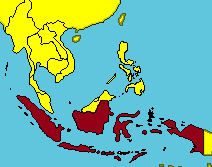

In the first few centuries after Christ many small monarchies developed in Java, Bornea, Celebes and Sumatra. Their basis were Indian cultures. The empire of Sriwijaya (7th century) expanded under the dynasty of Shailendra covering almost the entire archipelago. Gradualy towards the 9th century they lost their predominance. Eventually in 1377 Sriwijaya was taken over by the empire of Majapahit. From 1293 to 1520 Majapahit dominated mid and East Java as well as Madura. Malakka and nearly the entire archipelago was now under Majapahits.
Malakka quickly rose to become the economic centre point in South East Asia which subsequently triggered Majapahits' downfall. Islamic law was introduced to the archipelago region which accelerated the ruin of the Majapahits.
Several sultanates were founded, like Demak in 1518, Bantenund in 1552 and Mataram in 1586.
Colonialism:
From 1498, when the sea passage to India was discovered, it only was a matter of time for Europeans to advance to the South East Asian region. They very quickly took over the lucrative spice trade which was so far dominated by Oriental traders. In 1602 the United East Indian Partnership was formed. It was the basis of the Dutch colonial empire in Indonesia. In 1800 the United East Indian Partnership seized to exist and all the possessions were taken over by the Dutch government. In 1908 a national movement rose which later in 1927 transformed into the national party lead by A. Sukarno which at the final stage developed into the Indonesian Party. The Dutch government fiercely tried to shatter the peace movement, at last without success. It was the Japanese invasion in 1942 in the course of the second world war which ended the Dutch rule.
Indonesia today:
A. Sukarno and M. Hatta declared the Free Republic of Indonesia on 17 August 1945. The Dutch government declared in 1949 at the Conference of The Hague to hand over all sovereign rights unconditionally to Indonesia. Prior to the declaration the Dutch launched two military actions to prevent their loss. Thereafter Sukarno was elected president of state. A centralistic republic was founded. In 1955 Sukarno's National Party finally won the election. He prohibited opposition parties and named himself president for life, the same status was granted to the military chief commander. Resistant movements were suppressed. In 1963 economical, political as well as military actions followed against Malaysia. Indonesia approaches China and the UdSSR. Indonesia exits the United Nations in 1965.
The communists unsuccessfully landed a coup in 1965 which was shattered by General Suharto. In 1966 he becomes provisional president. Indonesia again enters the United Nations and also ASEAN. Suharto is officially elected president in 1968. In 1969 Irian Jaya becomes part of Indonesia. In 1976 Portuguese East Timor becomes Indonesian territory after military intervention. At the end of 1997 Indonesia is hampered by political unrest. Suharto has to step down in May 1998 after six terms in office.
On 21 May 1998, Prof Dr Ing Bacharunddin Jusuf Habibie was made president. Indonesia looses power in East Timor in 1999 after Jakarta agrees to the International Peace keeping Force. Student protests force upon new elections in October 1999.
The new president of Indonesia is Abdurrahman Wahid, in office since 20 October 1999. On January 1st 2000 president Abdurrahman Wahid agrees to rename Irian Jaya to PAPUA during a visit to Jayapura.